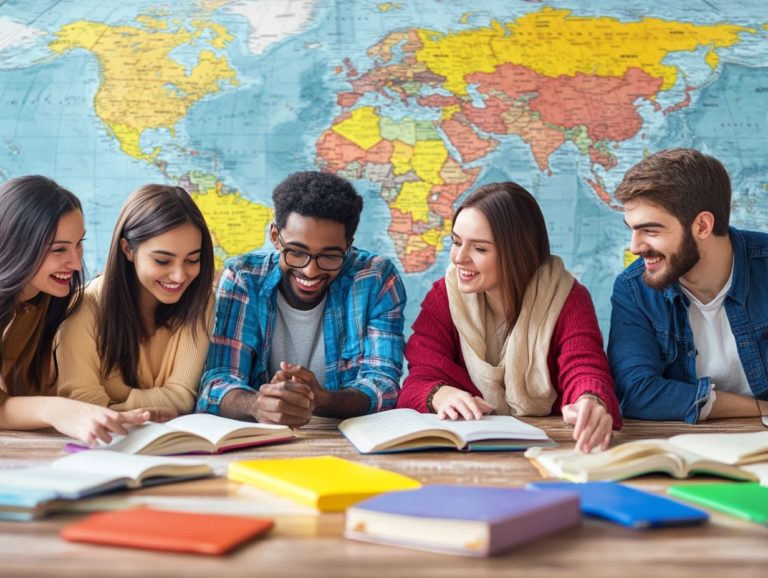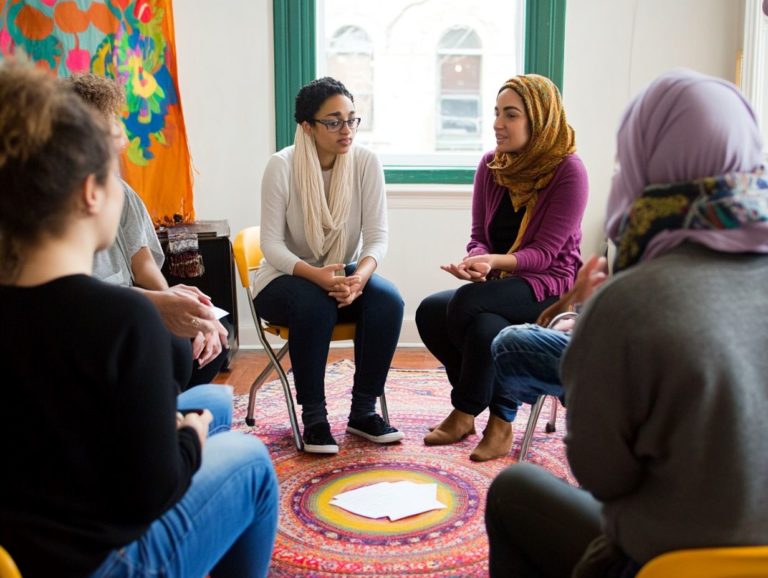How to Navigate Language Barriers While Abroad
Traveling to new places is exciting. However, language barriers can make connecting with locals difficult and hinder your ability to fully immerse yourself in the culture.
This article explores the causes and types of language barriers while offering practical tips for overcoming them. You ll find effective communication strategies, essential phrases, and insights on using technology, like translation apps, to navigate these challenges with confidence.
Discover how to prepare, communicate, and respect cultural differences to enhance your travel experience and create unforgettable memories.
Contents
- Key Takeaways:
- Understanding Language Barriers
- Get Ready: Tackle Language Barriers Before You Go!
- Tips for Communicating Effectively in a Foreign Language
- Utilizing Technology to Overcome Language Barriers
- Dealing with Language Barriers in Emergency Situations
- Cultural Etiquette When Communicating Across Language Barriers
- Frequently Asked Questions
- 1. How can I overcome language barriers while traveling abroad?
- 2. What are some effective communication strategies in a foreign language?
- 3. How can I prepare for a trip to a country where I don’t speak the language?
- 4. What should I do if I encounter a language barrier while abroad?
- 5. Is it rude to speak in English when traveling to a non-English speaking country?
- 6. How can I improve my language skills while traveling abroad?
Key Takeaways:
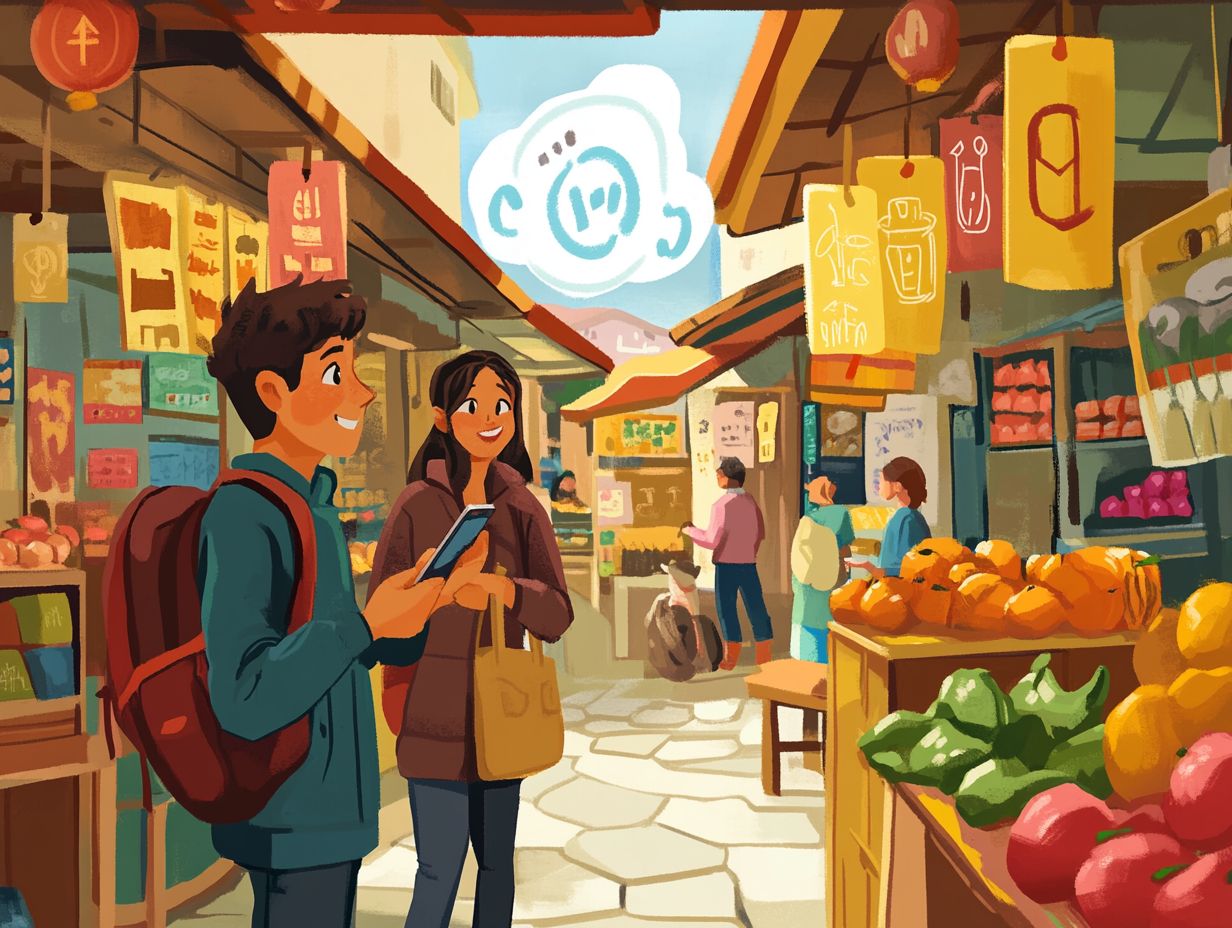
- Language barriers can arise from various factors such as linguistic, cultural, and environmental differences.
- Before traveling, it s important to learn basic phrases and understand cultural sensitivities for effective communication in a foreign language.
- Technology can help overcome language barriers, but it’s crucial to learn and respect cultural differences in communication.
Understanding Language Barriers
Grasping language barriers can enhance your travel adventures, especially in countries like Thailand, Colombia, and Vietnam. These barriers can arise from differences in vocabulary, pronunciation, and cultural differences.
Misunderstandings can easily lead to travel anxiety and frustration. Therefore, it’s essential to be aware of these challenges and adopt effective strategies to overcome them. By appreciating the importance of effective communication, you can fully immerse yourself in the local culture and build meaningful connections during your journeys.
Causes and Types of Language Barriers
Language barriers can stem from various sources, including communication challenges due to linguistic differences, cultural misunderstandings, and even non-verbal cues like body language. These barriers may manifest in several ways, such as vocabulary gaps or unfamiliar accents, complicating conversations between travelers and locals.
For instance, greetings and gestures can vary dramatically across cultures, leading to possible misinterpretations. A simple nod might indicate agreement in one culture but could come across as indifference in another. Verbal communication can also be obstructed by regional language variations, slang, or local expressions that may feel entirely foreign.
To navigate these hurdles effectively, equip yourself with essential phrases in the local language, use translation apps, and pay attention to context and tone. Additionally, learning how to overcome language barriers while traveling by observing body language and being mindful of local customs can further enhance your interactions, helping to bridge the gaps that language differences might create.
Get Ready: Tackle Language Barriers Before You Go!
Preparing for language barriers before your travels is essential for ensuring a smooth and enriching experience in new environments like Guatemala or Nicaragua. For helpful insights, consider navigating language requirements for study abroad.
Engaging with language learning apps such as Duolingo can help you grasp essential phrases and cultural nuances, allowing you to connect more deeply with the local culture.
Hire a bilingual guide and learn basic communication strategies to boost your travel experience, making it easier for you to navigate various tourist destinations with confidence.
Language Learning and Cultural Sensitivity
Language learning serves as an invaluable tool for cultivating cultural sensitivity and elevating your travel experience, especially in countries like Ecuador and Bolivia.
By mastering essential phrases and gaining insight into the local culture, you can engage more meaningfully with locals and enhance your overall journey.
When you take the time to learn key expressions greetings, polite requests, and common courtesies you lay the groundwork for genuine interactions. Grasping the significance of local customs and traditions can transform a simple exchange into a memorable dialogue.
Diving into cultural nuances boosts your confidence and demonstrates respect. This makes locals more receptive and welcoming.
Get ready to learn effectively! Consider using language-learning apps, flashcards, or even enrolling in short courses before your trip.
This preparation will pay off, as a deeper cultural understanding enriches your travel experience, turning you into an engaged participant in the local community.
Tips for Communicating Effectively in a Foreign Language
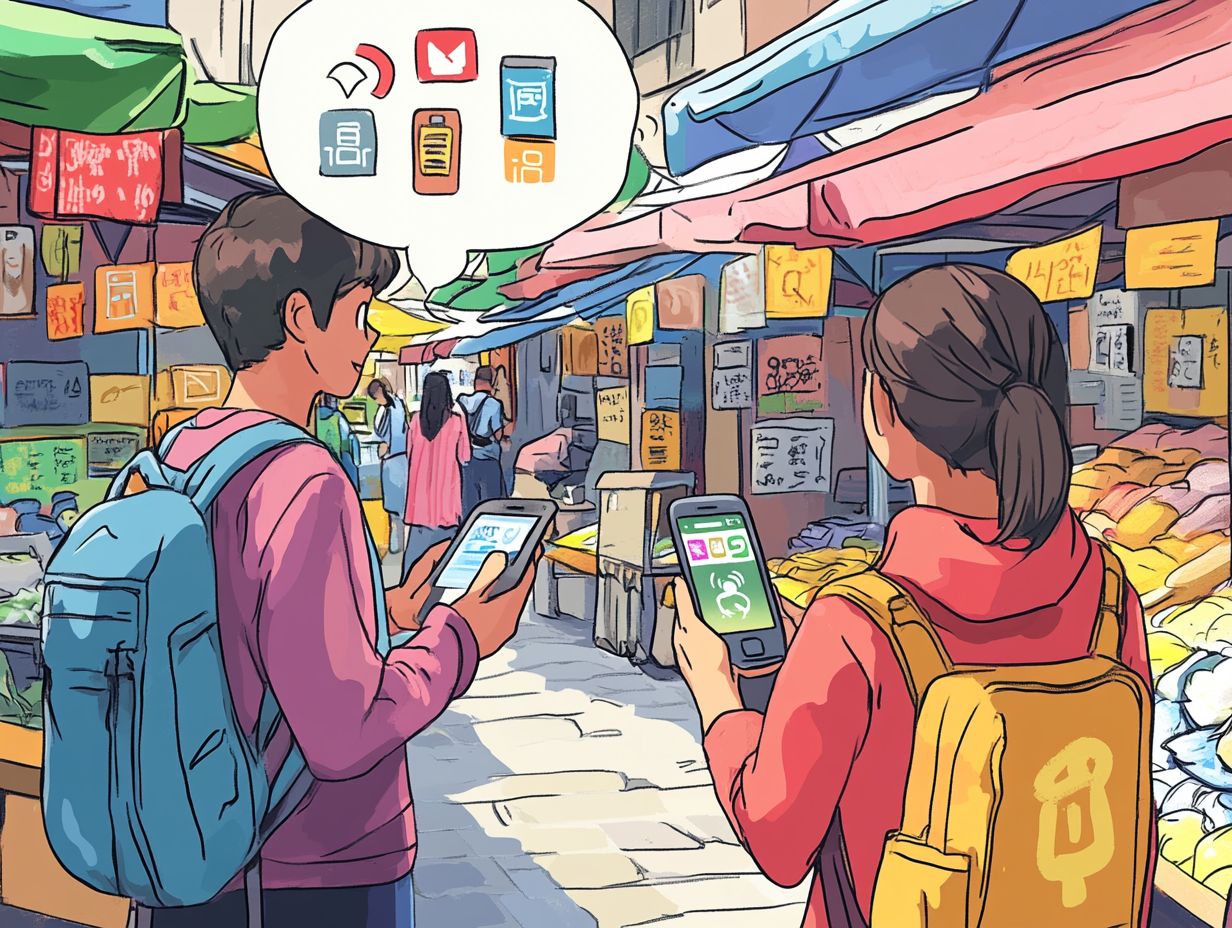
Effectively communicating in a foreign language can greatly elevate your travel experience, helping you overcome communication barriers and forge genuine connections with locals.
By mastering basic phrases and employing non-verbal techniques, such as body language, you can facilitate smoother interactions in iconic tourist destinations like Paris.
Non-Verbal Communication and Basic Phrases
Non-verbal communication is your secret weapon for overcoming language barriers, especially when paired with some basic phrases.
Understanding body language and gestures allows you to convey messages effectively and foster positive interactions during your travels.
Take a simple thumbs up for example; it signals approval or understanding, while a nod often indicates agreement. A genuine smile can work wonders in establishing rapport, transcending any language limitations.
Mastering a few essential phrases, like “thank you” or “excuse me”, combined with the right non-verbal cues, can significantly enhance your experience.
In crowded markets or bustling streets, a friendly wave can communicate your intent and help break the ice.
Being mindful of local customs regarding personal space and eye contact enriches your interactions and demonstrates respect for the culture, making your travel experience all the more fulfilling.
Utilizing Technology to Overcome Language Barriers
Utilizing advanced technology like Google Translate and various translation apps can transform your travel experience, especially when faced with language barriers in foreign countries.
Tools such as Voice Translator and iTranslate offer instant translations, enabling seamless communication and simplifying your navigation through complex situations in places like Colombia and Vietnam.
Embracing these resources can truly enhance your journey, allowing you to connect more deeply with the local culture and people.
Translation Apps and Devices
Translation apps like Google Translate are essential tools for travelers, accessible on both Android and iPhone platforms, designed to bridge language gaps effortlessly.
Whether you prefer a traditional language dictionary or a digital translation tool, these resources significantly enhance your communication skills and make navigating unfamiliar environments a breeze.
By utilizing advanced features such as voice recognition technology that understands spoken words and offline capabilities, these applications provide invaluable assistance in real-time situations.
Other options, like Microsoft Translator and iTranslate, bring unique functionalities to the table, including photo translation and conversation modes that adapt to various scenarios.
When choosing the most suitable translation tool for your travel needs, consider factors like ease of use, supported languages, and the availability of offline modes.
To ensure a smooth journey, download these apps now to ensure you re ready for your adventure!
Dealing with Language Barriers in Emergency Situations
Navigating language barriers in emergency situations demands quick thinking and a firm grasp of essential emergency phrases. Mastering effective communication during crises can significantly ease anxiety and enhance safety while you travel internationally.
Emergency Phrases and Contact Information
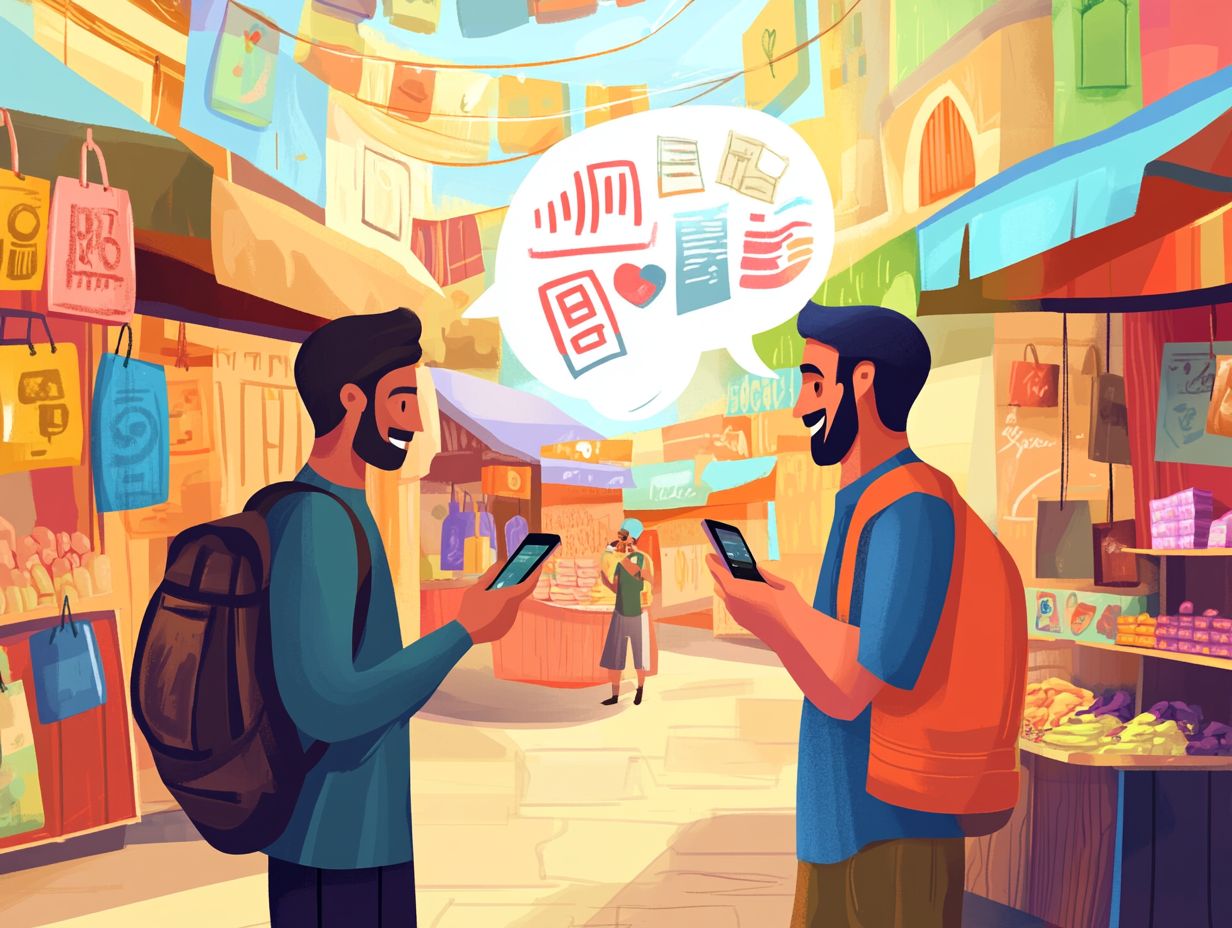
Having emergency phrases ready can save your life when every second counts. It can help you overcome communication challenges when every second matters. Organize your contact information so you can access it quickly in a crisis.
Your list should include essential phrases like:
- “I need help,”
- “Call an ambulance,”
- “Where is the nearest hospital?”
These expressions can help cut through the frustration and confusion in critical moments. It s also important to keep vital contact information handy, especially when you find yourself in a crisis abroad.
By having these contacts readily available, you can respond swiftly and efficiently when unexpected situations arise.
Cultural Etiquette When Communicating Across Language Barriers
Cultural etiquette is essential when navigating language barriers. Grasping local customs and traditions nurtures respectful interactions. Whether you find yourself in a lively market in Vietnam or a serene caf in Paris, being aware of cultural nuances can profoundly enrich your travel experience.
Respecting Cultural Differences and Customs
Respecting cultural differences and customs is crucial for fostering positive interactions during your travels. Being aware of local practices doesn’t just enhance your travel experience; it also demonstrates respect for the people and places you encounter.
Take Japan, for instance. The tradition of bowing signifies respect, and understanding this gesture can create an immediate, favorable impression. Similarly, in many Middle Eastern cultures, using the right hand for greetings and exchanges is seen as polite.
When navigating these customs, it s beneficial to observe how locals interact and don t hesitate to ask questions if you’re unsure. Learning a few basic phrases in the local language can showcase your effort and intent, making conversations flow more smoothly. Ultimately, adapting to these cultural norms enriches your interactions and deepens your appreciation for the unique tapestry of experiences that each destination has to offer.
Frequently Asked Questions
1. How can I overcome language barriers while traveling abroad?
Learn basic phrases in the local language to overcome language barriers. Additionally, you can explore navigating language barriers by using translation apps, hiring a local guide, or traveling with a bilingual friend.
2. What are some effective communication strategies in a foreign language?
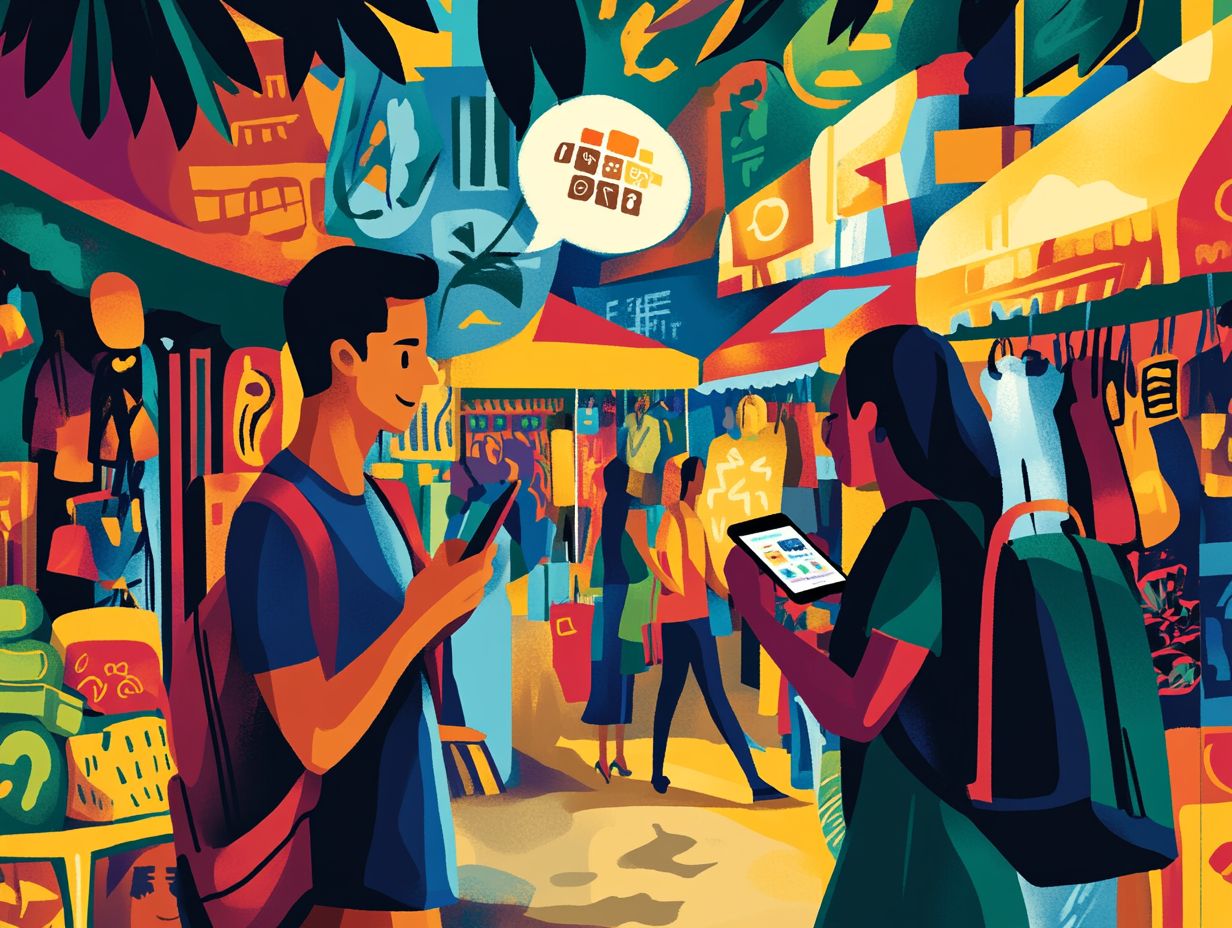
Non-verbal communication can be just as important as spoken language. Use body language, gestures, and facial expressions to convey your message. Speak slowly and clearly, and be patient with yourself and the person you are trying to communicate with.
3. How can I prepare for a trip to a country where I don’t speak the language?
Research the local culture and customs beforehand. Learn some basic phrases and key words in the local language. Make sure to have a translation app or phrasebook with you, and consider hiring a local guide to help you navigate the language barrier.
4. What should I do if I encounter a language barrier while abroad?
If you find yourself unable to communicate in a foreign language, stay calm and use non-verbal communication. Try using simple words and phrases, and don’t be afraid to ask for help. Locals are often happy to assist and may even appreciate your effort to communicate in their language.
5. Is it rude to speak in English when traveling to a non-English speaking country?
No, it’s not rude to speak in English abroad.
However, it’s polite to try and learn some basic phrases in the local language. This is a great way to show respect for the local culture. Plus, it can help bridge any communication gaps!
6. How can I improve my language skills while traveling abroad?
The best way to improve your language skills is through immersion.
Surround yourself with the local language as much as possible. Listen to the radio, watch TV, or chat with locals.
You can also take language classes or practice with a language exchange partner.

